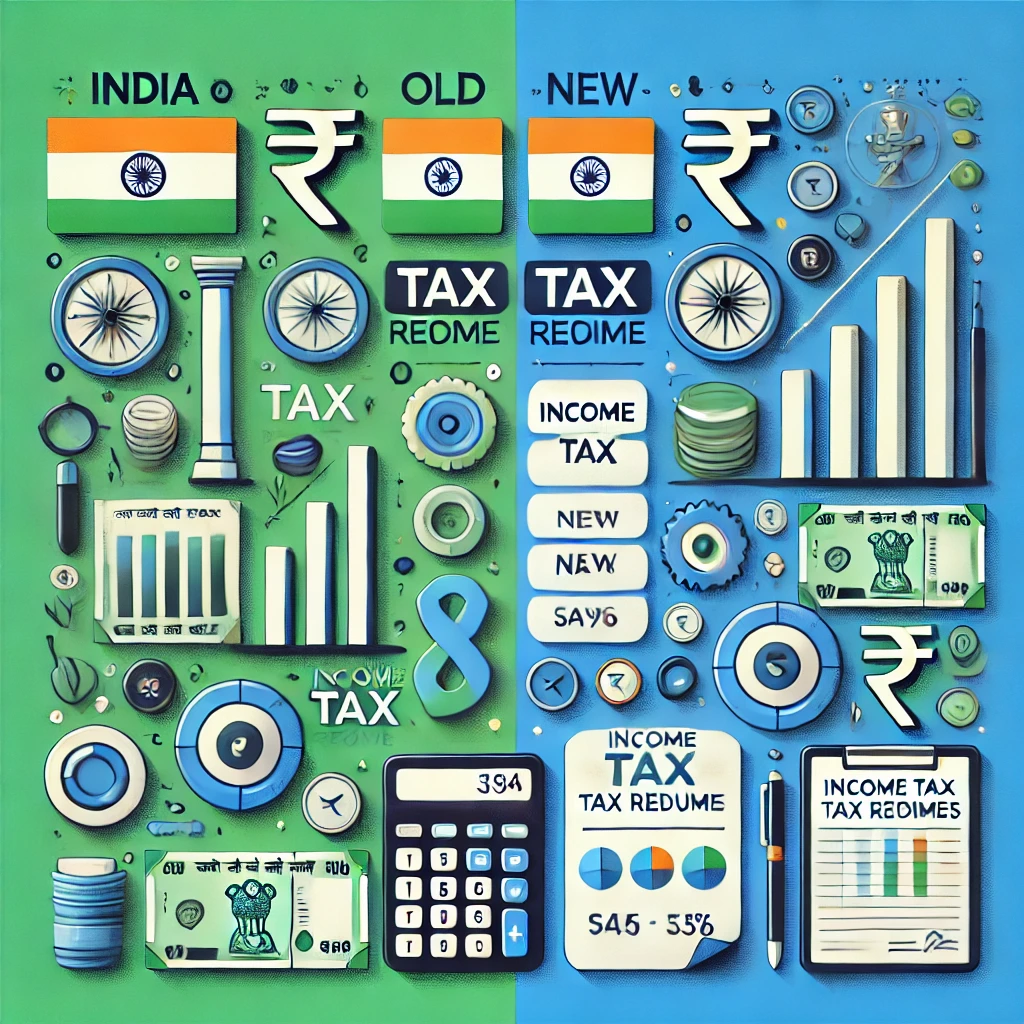New vs. Old Tax Regime Which One Should You Choose?
Learn the key differences between India's new and old tax regimes, understand their benefits, and make an informed decision with the help of our Income Tax Calculator.
Post last updated: November 5, 2024
💰 New vs. Old Tax Regime: Which One Should You Choose?
India's evolving tax system has provided individuals with two options for calculating and paying their income tax: the Old Tax Regime and the New Tax Regime. Each regime offers distinct benefits, and selecting the right one depends on your income, deductions, and financial goals. Let’s break down the differences and help you decide which one works best for you.

📊 Understanding the Two Tax Regimes
🏛️ Old Tax Regime
The old system allows taxpayers to reduce their taxable income by leveraging various exemptions and deductions. This regime is well-suited for those who invest in tax-saving instruments or incur specific expenses eligible for exemptions.
- Multiple exemptions, such as House Rent Allowance (HRA) and Leave Travel Allowance (LTA).
- Deductions like:
- Section 80C: Investments in PPF, ELSS, NSC, life insurance premiums, etc. (up to ₹1.5 lakh).
- Section 80D: Health insurance premiums.
- Section 24: Home loan interest deduction.
- Slab rates are higher compared to the new regime.
✨ New Tax Regime
Introduced in FY 2020-21, the new tax regime simplifies tax calculations by eliminating exemptions and deductions but offering reduced tax rates. It’s ideal for individuals who prefer straightforward tax computation or do not utilize tax-saving investments.
- Lower income tax rates across slabs.
- No requirement to claim deductions or exemptions.
- Limited to no tax planning required.
💡 Comparison of Tax Slabs
| Income Slabs (₹) | Old Regime Tax Rates | New Regime Tax Rates |
|---|---|---|
| 0 - 2,50,000 | Nil | Nil |
| 2,50,001 - 5,00,000 | 5% | 5% |
| 5,00,001 - 7,50,000 | 20% | 10% |
| 7,50,001 - 10,00,000 | 20% | 15% |
| 10,00,001 - 12,50,000 | 30% | 20% |
| 12,50,001 - 15,00,000 | 30% | 25% |
| Above 15,00,000 | 30% | 30% |
🔍 Which Tax Regime Should You Choose?
🏦 Choose the Old Tax Regime if:
- You claim significant deductions under Section 80C, 80D, and other provisions.
- You pay a substantial amount in home loan interest.
- You receive exemptions like HRA or LTA.
Example: An individual earning ₹10,00,000 annually who utilizes deductions under Section 80C (₹1,50,000), Section 80D (₹50,000), and home loan interest (₹2,00,000) can significantly reduce taxable income in the old regime.
📈 Choose the New Tax Regime if:
- You don’t avail many deductions or exemptions.
- You prefer simplicity in tax calculations.
- Your income level doesn’t justify heavy investment in tax-saving instruments.
Example: An individual earning ₹8,00,000 annually but without major deductions benefits more from the reduced tax rates under the new regime.
🤔 Key Considerations Before Deciding
- Analyze Your Deductions: Calculate how much you save under the old regime with your exemptions.
- Simplicity vs. Savings: Decide whether ease of computation or maximum tax savings is more important for you.
- Future Financial Plans: Align your choice with your financial goals, such as investments, insurance, or loans.
✨ Make an Informed Decision Easily
For a precise calculation of your tax liabilities under both regimes, visit our 👉 Income Tax Calculator 🌟. This user-friendly tool provides a detailed breakdown of your tax savings, helping you confidently choose the right regime.
1️⃣ Can I switch between the old and new tax regimes every year?
- Salaried employees: Yes, you can switch between regimes each financial year while filing your income tax return.
- Business owners and professionals: Once you choose the new regime, you can’t switch back unless you cease to have business income.
2️⃣ Are there any deductions allowed in the new tax regime?
Most deductions are not available, but you can still claim employer contributions to NPS (Section 80CCD(2)) and the standard deduction of ₹50,000 (as of FY 2023-24).
3️⃣ Which regime is better for salaried individuals?
It depends on your salary structure and investment habits. The old regime works better if you claim multiple exemptions and deductions. The new regime is suitable for those with limited tax-saving investments.
4️⃣ Do I need to inform my employer about my choice of regime?
Yes, you must inform your employer at the start of the financial year for accurate TDS (Tax Deducted at Source) deductions.
5️⃣ What happens if I don’t choose a regime?
If you don’t specify, your employer will default to the old regime for TDS. However, you can change this while filing your income tax return.
Have questions or need support? Feel free to reach out to us!
Email: admin@fincalci.com
Author:





